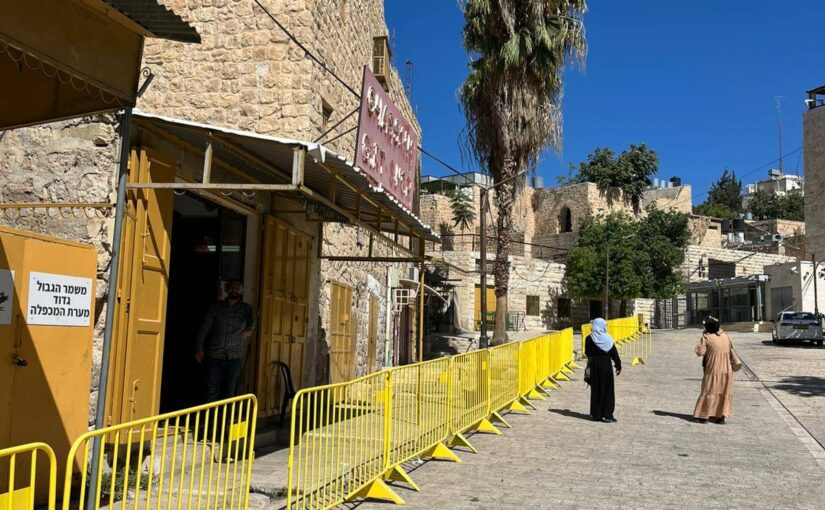December 30 – Al Khalil (Hebron)
By Birdie
This week has been a bad one for al Amal. Soldiers issued new threats to him, a souvenir-shop owner on the main drag in the Old City of Hebron (al Khalil), and his neighbours demanding that they close. And today, the mosque director refused to be searched when going through the checkpoint, and was beaten up by the military so badly he needed hospitalisation. Things are escalating for al Amal and the traders in the Old City. Again.
Al Amal’s shop is deep in the Old City – the beautiful Mamluk and Ottoman stone alleys that are the heart of many of Palestine’s ancient cities: Old Jerusalem, Nablus, Bethlehem and al Khalil. They are the souk – lined with stores which in reasonable times are bustling with life, leisure, and commerce. Al Amal’s store is within 100 metres of the holy place: the al Ibrahimi Mosque, also known as the Cave of the Patriarchs, that contains the ostensible tombs of Abraham, Isaac and Jacob and their wives. It might be considered a favourable location. Sadly, that proximity is not an advantage. Access to the holy place is only through a fearsome checkpoint, because it is in the fenced-off, gated, and heavily-guarded area of the Jewish settlement in Hebron.
The soldiers’ threats are new, but the experience is familiar to al Amal. His family’s shop has been forcibly closed and reopened more than once. They have had a shop in al Khalil for multiple generations. His grandfather started a souvenir and crafts shop in As-Sahle Street. It’s not there any more. There are no shops there any more. They were all closed and none of their previous owners can access them, because As-Sahle street is in the settlement. And no one who doesn’t live in the settlement – except tourists and those with special dispensation– is allowed in through the checkpoints that guard the self-imposed ghetto that is the settlement.
Back in 2000, al Amal tells me, during the intifada all the shops there were closed, more than 1,800. Reopening them was a real ordeal (in the face is settler harassment) and required permits and support from local authorities and international organisations, but after 7 October 2023, the closures were demanded again, this time for good. And the current, concrete checkpoint with its grey corridors of hell – all clanging metal gates, glassed-off inspection point, and electric cattle turnstiles was erected.
But Al Amal was not going to give up. Since the age of 10 he has been doing business in al Khalil, latterly working in the family shop to help support his five sisters and two brothers.
So earlier this year he opened a new, small boutique on this side of the checkpoint, selling quality fabrics, bags, and kuffiehs. And now the threat of forced closure is being replayed.
“Three or four soldiers came to the Old City and told us to close. I asked them why. There is no reason,” reports al Amal. “I told them, I want to see formal papers ordering the closure; you want to arrest me, arrest me! So the soldier pushed my table of goods back into the shop. I asked, What do you want from me?”
The next day, Thursday, the soldiers came back and again demanded, “From the checkpoint up to here, the shops must close.” That’s seven or eight more businesses to close.
The rumour is, I’m told, that they’re planning to move the checkpoint itself up the street to that corner, thus expanding the gated settlement further. In the meantime, the store holders are afraid, angry, and ever more insecure.
Al Amal is dismayed, but certain of his position. “I’m still open. I will keep resisting,” he says. For him keeping the shop open is not about making good money, it is more about making a stand against oppression and occupation and maintaining a presence in the place. “I was born here; I grew up here; this is my land. It’s a holy land for us.”
Business has actually been very bad. The war has kept tourists away, and this week’s harassment also keeps locals away, not wanting to be where trouble might catch up with them. But al Amal is not giving up. He urges me to tell people to come. “It’s safe,” he says. And for tourists that is true. The shopkeepers are desperate for the business.
Al Amal speaks for many of them when he says: “Even if there’s no business we have to keep the shop open.” Their presence here is about sumud: steadfastness. Existence is resistance. They are determined not to allow the occupation to humiliate and force Palestinian people to leave.

